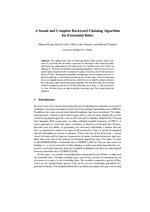Inproceedings4064: Unterschied zwischen den Versionen
Long Cheng (Diskussion | Beiträge) K (1 Version: Automatically imported publication data from DBLP) |
Michael Thomazo (Diskussion | Beiträge) Keine Bearbeitungszusammenfassung |
||
| Zeile 1: | Zeile 1: | ||
{{Publikation Erster Autor | {{Publikation Erster Autor | ||
|ErsterAutorVorname=Mélanie | |||
|ErsterAutorNachname=König | |ErsterAutorNachname=König | ||
|FurtherAuthors=Michel Leclère;Marie-Laure Mugnier;Michaël Thomazo; | |||
|FurtherAuthors= | |||
Michel Leclère; | |||
Marie-Laure Mugnier; | |||
Michaël Thomazo; | |||
}} | }} | ||
{{Inproceedings | {{Inproceedings | ||
|Referiert=1 | |Referiert=1 | ||
|Title=A Sound and Complete Backward Chaining Algorithm for Existential Rules | |Title=A Sound and Complete Backward Chaining Algorithm for Existential Rules | ||
|To appear=0 | |||
|Year=2012 | |Year=2012 | ||
|Booktitle=Proceedings of the 6th International Conference on Web Reasoning and Rule Systems (RR 2012) | |||
|Booktitle=RR | |||
|Pages=122-138 | |Pages=122-138 | ||
|Publisher= | |Publisher=Springer | ||
}} | }} | ||
{{Publikation Details | {{Publikation Details | ||
|Abstract= | |Abstract=We address the issue of Ontology-Based Data Access which consists | ||
| | of exploiting the semantics expressed in ontologies while querying data. | ||
| | Ontologies are represented in the framework of existential rules, also known as | ||
Datalog+/-.We focus on the backward chaining paradigm, which involves rewriting | |||
the query (assumed to be a conjunctive query, CQ) into a set of CQs (seen as a | |||
union of CQs). The proposed algorithm accepts any set of existential rules as input | |||
and stops for so-called finite unification sets of rules (fus). The rewriting step | |||
relies on a graph notion, called a piece, which allows to identify subsets of atoms | |||
from the query that must be processed together. We first show that our rewriting | |||
method computes a minimal set of CQs when this set is finite, i.e., the set of rules | |||
is a fus. We then focus on optimizing the rewriting step. First experiments are | |||
reported. | |||
|Download=Rr-12-klmt.pdf | |||
|DOI Name=10.1007/978-3-642-33203-6_10 | |||
|Forschungsgruppe=Computational Logic | |||
|DOI=http://dx.doi.org/10.1007/978-3-642-33203-6_10 | |DOI=http://dx.doi.org/10.1007/978-3-642-33203-6_10 | ||
}} | |||
| | {{Forschungsgebiet Auswahl | ||
|Forschungsgebiet=Existenzielle Regeln | |||
}} | }} | ||
Aktuelle Version vom 28. Oktober 2014, 11:51 Uhr
A Sound and Complete Backward Chaining Algorithm for Existential Rules
Mélanie KönigMélanie König, Michel LeclèreMichel Leclère, Marie-Laure MugnierMarie-Laure Mugnier, Michaël ThomazoMichaël Thomazo
A Sound and Complete Backward Chaining Algorithm for Existential Rules
Proceedings of the 6th International Conference on Web Reasoning and Rule Systems (RR 2012), 122-138, 2012. Springer
- KurzfassungAbstract
We address the issue of Ontology-Based Data Access which consistsof exploiting the semantics expressed in ontologies while querying data. Ontologies are represented in the framework of existential rules, also known as Datalog+/-.We focus on the backward chaining paradigm, which involves rewriting the query (assumed to be a conjunctive query, CQ) into a set of CQs (seen as a union of CQs). The proposed algorithm accepts any set of existential rules as input and stops for so-called finite unification sets of rules (fus). The rewriting step relies on a graph notion, called a piece, which allows to identify subsets of atoms from the query that must be processed together. We first show that our rewriting method computes a minimal set of CQs when this set is finite, i.e., the set of rules is a fus. We then focus on optimizing the rewriting step. First experiments are
reported. - Forschungsgruppe:Research Group: Computational LogicComputational Logic
@inproceedings{KLMT2012,
author = {M{\'{e}}lanie K{\"{o}}nig and Michel Lecl{\`{e}}re and
Marie-Laure Mugnier and Micha{\"{e}}l Thomazo},
title = {A Sound and Complete Backward Chaining Algorithm for Existential
Rules},
booktitle = {Proceedings of the 6th International Conference on Web Reasoning
and Rule Systems (RR 2012)},
publisher = {Springer},
year = {2012},
pages = {122-138},
doi = {10.1007/978-3-642-33203-6_10}
}
